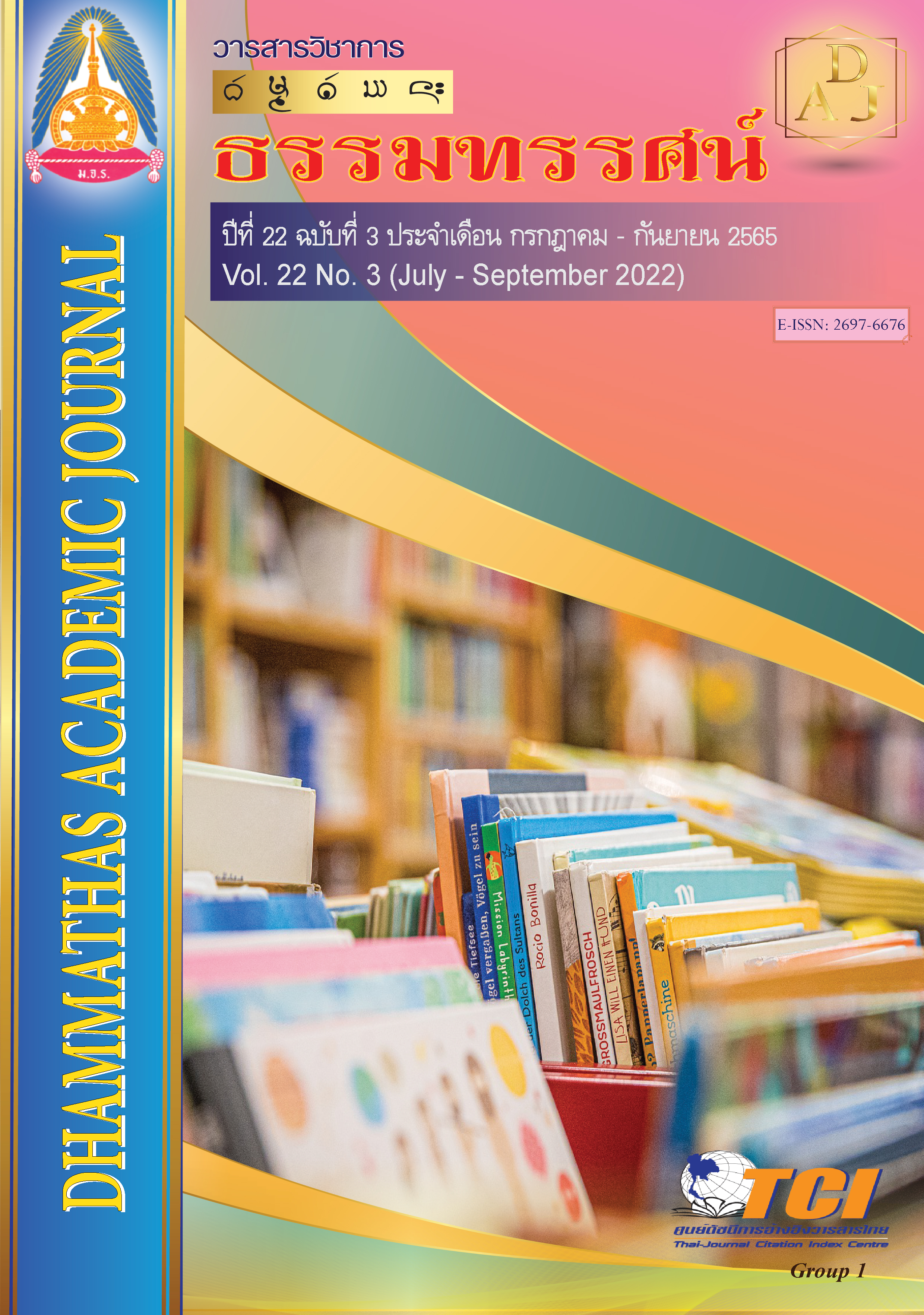Students’ Advanced Competency Development on Integrative Learning Management Using Cross-Subject Lessons Continuously Linked with Analytical Thinking towards Performance Evaluation Skills through Online and Onsite Systems
Main Article Content
Abstract
The objectives of this research were: 1) to develop students’ advanced competency on integrative learning management using cross-subject lessons continuously linked with Analytical Thinking towards Performance Evaluation Skills through online and onsite systems, that meta high-quality criterion; 2) to study students’ satisfaction with such integrative learning management. This research was carried out by means of classroom action research according to the preliminary experimental research model, one-group with post-study assessment. The target group included 30 students of the Master of Education Program who studied ED 22301 Practicum. The research instruments consisted of the integrative learning management plans, performance assessment and a satisfaction assessment form. The obtained data were analyzed by Mean (), Standard Deviation (S.D.), while, the quality results were interpreted according to defined criteria.
The research results were as follows:
1. The students’ advanced competency on integrative learning management using cross-subject lessons continuously linked with Analytical Thinking towards Performance Evaluation skills through online and onsite systems, and its quality were overall rated at a high level ( = 4.44, S.D. = 0.31); this met the set criterion.
2. The students’ satisfaction with integrative learning management using cross-subject lessons continuously linked with Analytical Thinking towards Performance Evaluation skills through online and onsite systems, and its quality were overall rated at a high level ( = 4.79, S.D. = 0.41); this met the set criterion.
Article Details

This work is licensed under a Creative Commons Attribution-NonCommercial-NoDerivatives 4.0 International License.
เพื่อให้เป็นไปตามกฎหมายลิขสิทธิ์ ผู้นิพนธ์ทุกท่านต้องลงลายมือชื่อในแบบฟอร์มใบมอบลิขสิทธิ์บทความ ให้แก่วารสารฯ พร้อมกับบทความต้นฉบับที่ได้แก้ไขครั้งสุดท้าย นอกจากนี้ ผู้นิพนธ์ทุกท่านต้องยืนยันว่าบทความ ต้นฉบับที่ส่งมาตีพิมพ์นั้น ได้ส่งมาตีพิมพ์เฉพาะในวารสาร วิชาการธรรม ทรรศน์ เพียงแห่งเดียวเท่านั้น หากมีการใช้ ภาพหรือตารางของผู้นิพนธ์อื่นที่ปรากฏในสิ่งตีพิมพ์อื่นมาแล้ว ผู้นิพนธ์ต้องขออนุญาตเจ้าของลิขสิทธิ์ก่อน พร้อมทั้ง แสดงหนังสือที่ได้รับการยินยอมต่อบรรณาธิการ ก่อนที่บทความจะได้รับการตีพิมพ์References
กัญจนา ลินทรัตนศิริกุล. (2550). การวิจัยเชิงทดลอง เอกสารการเรียนรู้การทำวิจัยด้วยตนเอง. กรุงเทพฯ: มหาวิทยาลัยสุโขทัยธรรมาธิราช.
ชนาธิป พรกุล. (2561). กระบวนการสร้างความรู้ของครูกรณีการสอนบูรณาการ. กรุงเทพฯ: จุฬาลงกรณ์มหาวิทยาลัย.
ญาธิป อุปถัมภ์. (2564). การพัฒนาความสามารถด้านการอ่านเพื่อความเข้าใจ กลุ่มสาระการเรียนรู้ภาษาไทย ของนักเรียนชั้นประถมศึกษาปีที่ 4 โดยใช้การจัดการเรียนรู้แบบ 5 ขั้น (5STEPs) ร่วมกับแผนผังความคิด. (วิทยานิพนธ์ศึกษาศาสตรมหาบัณฑิต). ขอนแก่น: มหาวิทยาลัยภาคตะวันออกเฉียงเหนือ.
ทิศนา แขมมณี. (2562). ศาสตร์การสอนองค์ความรู้เพื่อการจัดกระบวนการเรียนรู้ที่มีประสิทธิภาพ. (พิมพ์ครั้งที่ 23). กรุงเทพฯ: จุฬาลงกรณ์มหาวิทยาลัย.
บุญชม ศรีสะอาด. (2545). การวิจัยเบื้องต้น. (พิมพ์ครั้งที่ 7). กรุงเทพฯ: สุวีริยาสาส์น.
ไพฑูรย์ สินลารัตน์. (2563). หลักและเทคนิคการสอนระดับอุดมศึกษาจากการบรรยายแบบประเพณีโบราณสู่การสอนแบบไม่สอน. กรุงเทพฯ: จุฬาลงกรณ์มหาวิทยาลัย.
ลมินปภา อภิวัฒนางกูล. (2564). การพัฒนาทักษะปฏิบัติการทางวิทยาศาสตร์และความสามารถในการคิดวิเคราะห์ของนักเรียนชั้นประถมศึกษาปีที่ 4 โดยให้การจัดการเรียนรู้แบบ Predict-Observe-Explain (POE). (วิทยานิพนธ์ศึกษาศาสตรมหาบัณฑิต). ขอนแก่น: มหาวิทยาลัยภาคตะวันออกเฉียงเหนือ.
สำนักงานเลขาธิการสภาการศึกษา. (2560). แผนการศึกษาแห่งชาติ พ.ศ. 2560-2579. กรุงเทพฯ: พริกหวานกราฟฟิค.
Damanpour, F., and Gopalakrishman, S. (2001). The Dynamics of the Adoption of Product and Process Innovations in Organizations. Journal of Management Studies, 38(1), 45-65.
Joyce, B. & Weil, M. (1996). Models of leaching. (5th ed.). London: Allyn and Bacon.
Likert, R. (1970). Teaching for the measurement of attitudes. In G.F. Summer (Ed.) Attitudes measurement. New York: Rand Me Nally.
Paladino, A. (2006). Understanding the Drivers of Corporate Performance and Customer Value. In A Manzoni, Jean-Francois and Piscataway, Marc, Epstein (eds.). Performance Measurement and Management Control: Improving Organizations and Society. NJ: Elsevier Science.

